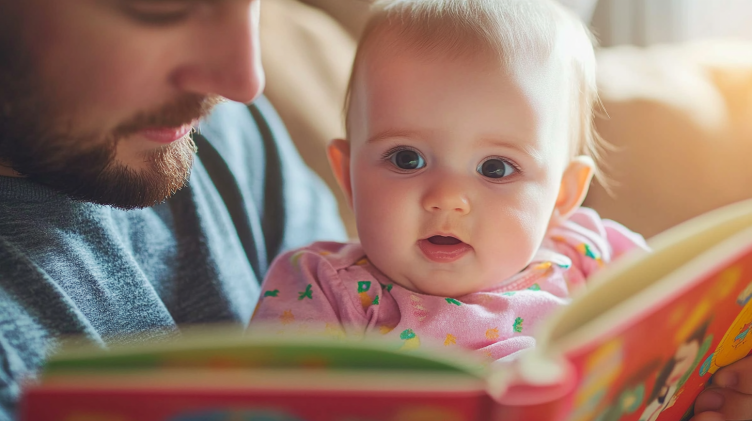When your baby first utters “mama” or “dada,” it’s an exciting milestone, but it’s just the beginning of their language journey. Around 6 to 12 months, babies begin experimenting with sounds and developing basic language skills. However, it’s essential to continue stimulating their speech development during this phase to lay the foundation for future communication.
The Golden Period for Language Growth
Babies undergo rapid language development between 6 and 12 months, a stage often referred to as the “golden period.” During this time, they start making sounds like “mama,” “papa,” and even responding to simple commands. This period is crucial because their brains are exceptionally receptive to learning new language patterns, making it the ideal time for parents to step in and encourage further language growth.

Key Components of Language Development
Before we dive into how to stimulate language growth, let’s understand the key factors that influence a baby’s ability to learn language.
1. Imitation: The Gateway to Language Learning
One of the most important ways babies develop language is through imitation. When your baby sees you speaking, they begin to internalize the sounds and gestures, which they later try to mimic. Saying words like “mama” and “papa” is an example of your baby mimicking your mouth shapes and sounds.

By frequently talking to your baby and expressing emotions, you provide them with more opportunities to absorb new words and imitate your speech patterns.
2. Emotional Bonding: Fueling Language Learning
Language development isn’t just about hearing words; it’s also deeply connected to emotional interaction. Babies are more motivated to communicate when there’s a warm, loving bond with their caregivers. Through eye contact, physical gestures, and verbal exchanges, your baby feels encouraged to try new sounds and words.

3. Input and Output: A Symbiotic Relationship
For language skills to develop, babies need both input and output. Input refers to the language your baby hears, such as conversations, stories, or songs. Output refers to the sounds they produce as they try to speak. The more language input babies receive, the richer their output becomes. It’s a continuous cycle of hearing, processing, and speaking that supports their growth.

Effective Ways to Stimulate Your Baby’s Language Development
Now that we understand the foundations of language development, let’s explore some practical strategies that can help you stimulate your baby’s speech.
1. Engage in Frequent Conversations: Be a “Language Enthusiast”
To help your baby develop their language skills, talk to them as much as possible. You can guide your baby’s learning through simple, clear phrases. For example:
- While changing a diaper: “Sweetheart, we’re putting on a fresh diaper. How does that feel?”
- During mealtime: “Mommy’s feeding you! Is the food yummy?”
- On a walk: “Look, a bird is flying outside!”

Although your baby may not fully comprehend everything you say, they will begin to associate words with objects and actions, which will help them grasp language more quickly.
2. Use Songs and Rhymes to Boost Learning
Babies are incredibly responsive to music, rhythm, and sound. Singing songs or reciting nursery rhymes helps your baby develop a sense of rhythm and word patterns, which can greatly improve their language skills. Many nursery rhymes are simple and repetitive, making them perfect for babies:
- “Twinkle, twinkle, little star, how I wonder what you are…”

These songs offer a rhythm that babies find engaging, and the repetition helps reinforce their vocabulary. To enhance their experience, you can add physical movements, such as clapping or waving your hands, to help connect language with actions.
3. Read Stories to Your Baby: Building Language Understanding
Although your baby may not understand complex storylines yet, reading to them is an excellent way to introduce them to the structure of language. Start with picture books that feature simple, colorful images and basic narratives:
- “This is a bunny hopping around. Oh, look, it found a big carrot!”
- “This is a bird in the tree, chirping ‘hello!’”

By reading these stories aloud, you help your baby recognize new words and associate them with images and actions. Over time, they will learn the rhythm of language and begin to understand its flow.
4. Encourage Your Baby to Express Themselves
While listening to language is vital, it’s equally important to encourage your baby to express themselves. Let them communicate their needs through gestures or sounds. For example, if they point to a toy, ask, “Do you want this toy? Say ‘give me’.” Or if they’re thirsty, prompt them to say “water.”

Even if your baby can only produce basic sounds or babbles, giving them opportunities to practice speaking is crucial for their language development. Every sound they make is a step toward mastering speech.
5. Play Pretend: Enhance Social Skills and Language Use
Role-playing games offer a fun and effective way to develop your baby’s language skills while also teaching them about social interactions. You can engage in activities like pretending to cook, clean, or play doctor, mimicking everyday actions and words.

Try playing pretend phone calls, where you use a toy phone to simulate conversations. These activities not only encourage your baby to imitate language but also help them understand its social function.
Conclusion
Supporting your baby’s language development is a rewarding and engaging experience. Through simple activities like talking, singing, and playing pretend, you can create a rich environment for language learning. The more you interact with your baby in meaningful ways, the more their speech skills will flourish. Remember, language development is a gradual process, but with consistency and patience, your baby will be well on their way to mastering communication.



















